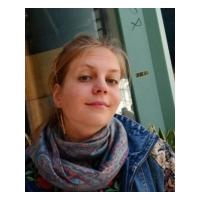On 6 June 2023, as part of the Tunisian Democracy Connectors project, we showed the documentary "Upon the shadow" by Tunisian director Nada Mezni Hafaiedh. Twenty people gathered on the couches and armchairs in Kulturraum 405 to participate in the event.
At the beginning of the film, we meet ex-Femen activist Amina Sboui, who was imprisoned and abused in prison because of her commitment to women's rights.
After her release, she opens the door of her house to Sandra, Ramy, Ayoub and Atef - LGBTQ+ individuals who have no other place to live.
Abandoned by their families, discriminated against and persecuted by Tunisian state apparatus and society, criminalised thanks to a law dating back to French colonial rule, the group finds home with each other. "We were forced to live together. All my friends are rejected from society. So I cannot help but open my door," says Amina.
Together they laugh and dance, dress up and do their hair, exorcise evil spirits, exchange affection and debate banal issues such as the unequal distribution of housework.
On the other hand, everyone here carries their own individual trauma, which the audience gradually learns about. Abuse, rape, family break-offs, being forced into prostitution as trans individuals are not allowed to work, daily hostility and the resulting psychological and physical consequences are impressively portrayed.
"The fact of living as you are is a crime in Tunisia."
Despite or because of these dramatic individual experiences, the group supports each other and becomes an island of solidarity and togetherness. Everyone's mantra: "I am free."
The group decides to make a video in which they offer people the opportunity to talk about their experiences as socially excluded people. A lawyer calls participation in this project suicidal. But the video goes viral - the fight for their own freedom continues tirelessly.
The film Upon the shadow was shown at Tunisia's largest film festival in 2017, creating attention and putting the issue of gender identity and orientation on the social agenda. A victory for minority rights!
Today, Amina, Sandra, Ramy, Ayoub and Atef no longer live in Tunisia, because the human rights situation (not only for LGBTQ+ individuals) has become even worse.
This also becomes clear in the subsequent panel discussion with the two Tunisian activists Khaled and Hishem. Both are committed to helping people who have been arrested under Article 230, which has criminalised homosexuality in Tunisia since French colonial rule. In the process, the regime covers up the actual numbers of arrests, lacks information about their rights and money for their defence in court.
Before Tunisian President Kais Said amassed enormous power with his new constitution on 25 July 2021, it was at least possible to collaborate with international organisations and embassies to advocate for LGBTQ+ individuals, Khaled says. Today, this is too dangerous, as the Said regime then draws accusations of conspiring with foreign countries at Tunisia's expense. The consequence: prison.
The constitution that gives Said all the power, suspends parliament and the separation of powers, was "approved" by society with the help of a referendum.
In fact, only 7.6% of those eligible to vote cast their ballot and thus also decided on the restriction of non-negotiable human rights - a process that is anything but democratic.
We, as part of the NGO Democracy International, are particularly interested in democratic and participatory decision-making processes as well as political participation, which is why our project Tunisian Democracy Connectors wants to pay attention to those very people who are doing everything in their power to fight for this. Like Amina, Sandra, Ramy, Ayoub and Atef. Commitment means networking, exchange and discourse. You can become part of this network by following this link and creating your own profile as activist: https://www.democracy.community/map
The film evening with subsequent discussion was stirring and rousing. The relevance of post-colonialism, the instrumentalisation of imperial remnants in favour of the expansion of one's own power (Kais Said), but also the effectiveness and strength of a Tunisian civil society became clear. It fights tirelessly and creates awareness for oppressed and marginalised individuals.



